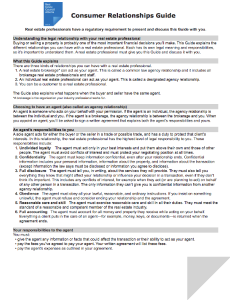By law, every realtor must explain to you agency relationship. It is important to make sure you understand it, and to ask questions if you don’t fully understand it. A good realtor discloses this brochure as early as possible. It makes the relationship between you and an agent transparent. You will have to sign this document. But this Consumer Relationship Guide is not a contract. It is an acknowledgement that you discussed it with the realtor, and that you understand it.
What is Agency Relationship?
Agency is a relationship where two parties agree to have one party act on behalf of the other. For example, when your lawyer acts on your behalf in court. If you decide to have a realtor act on your behalf, you form an agency relationship. You are now a client.
Realtors have many responsibilities towards their clients. A real estate transaction is a complex and important event. An agency relationship means the realtor must be discrete and carry out judgement while working on is client’s behalf. Realtors must protect and promote the clients’ best interest.
Your realtor is never allowed to disclose anything about price, motivation or personal information
Realtor’s Duties
The following duties are the 6 most important realtor’s duties (there are 26 duties in total):
- Undivided loyalty: A realtor must only work in a client’s best interest and must always put your interest above his/her own.
- Confidentiality: A realtor must keep confidential about his client, and about the property or the transaction, unless something is required to disclose by law. This confidentiality continues even after the agency relationship ends.
- Full disclosure: A realtor must tell his clients all the facts she/he knows. Any information that could affect the client’s relationship or influence decision in the real estate transaction.
- Obedience: A realtor must obey all his client’s instructions, as long as instructions are lawful.
- Reasonable care and skill: A realtor must exercise reasonable care and skill in performing all duties.
- Full accounting: A realtor must account for all money and property place in his/her hands, while acting on his client’s behalf.
Types of Relationships in real estate
When a buyer contacts the listing realtor to buy the house, a potential conflict will arise
- Sole Agency:
When a realtor only serves a buyer or a seller and can work in the best interest of his client.
- Transaction Brokerage:
A realtor represents both the buyer and the seller. For example, when a buyer contacts the listing realtor to buy the house. This could become a potential conflict. Because a realtor can only serve one client at best, now the realtor must serve two parties. Transaction brokerage can be formed in this case. Transaction brokerage is only allowed when both parties, buyer and seller, agree. An agreement must be signed by both parties and the realtor becomes a transaction facilitator. A realtor must make sure that anything he tells one party, he must also tell the other party.
But a realtor is still not allowed to disclose anything about price, motivation or personal information. For example, he is not allowed to tell the buyer that the seller is willing to take a lower price or that the buyer is willing to pay much more. The realtor is not allowed to tell why the buyer wants to buy or the seller wants to sell. Any of this information will affect one party. The realtor must stay in the middle as a facilitator.
- Customer status:
If someone does not want to form an agency relationship, one becomes a customer. It is the opposite of a client status. A realtor does not have any agency duties towards a customer. But a realtor can still not be dishonest and cannot give false or misleading information. Towards a customer, a realtor will have no loyalty or confidentially. She/he will not provide a customer full disclosure and will not give any advice.
Conflicts of Interest in real estate
Most transactions in Calgary involve two realtors
- Either the buyer or the seller gets a different agent.
- Buyer or seller decide to stay with the agent, but takes on customer status.
- Or the agent helps facilitate the entire transaction and will not act in favor of any side. Both parties, buyer and seller must agree on this change in relationship, because now, the agent now has reduced agency responsibilities.
Agents responsibilities when becoming a facilitator
When the realtor becomes a facilitator in the real estate transaction, s/he is bound by the following:
- Must be impartial and treat both parties even handed.
- Cannot give any confidential advice, nor support only one side or benefits the one of the other.
- Give both sides real estate statistics and information, including comparable property in formation.
- Give you all the relevant documents and instructions.
- Pass on all information that to other side wants to know, so keep both parties informed equally.
- Keep both parties informed and updated of progress.
Client’s Duties
As a client you also have duties towards the realtor:
- A client must compensate for expenses while the realtor performed for the client
- As well, a client must pay for any agreed fee. This fee is outlined in a signed service agreement.
- And a client must tell the realtor anything that could affect the transaction. For example, your financial situation changed and now you cannot afford to buy anymore.
The above information is a recap of the official document, which is issued by the Real Estate Council of Alberta. You can download the full brochure here.
Please note: The above is general information and not considered legal advice. We do our best to write informative articles about real estate in Calgary, Alberta. If you have any questions or concerns about our comments, please feel free to contact us or speak to your legal advisor.
